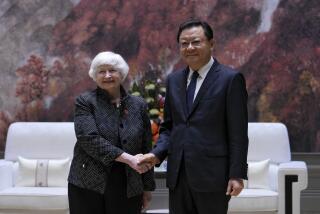As Chinese stocks tumble, global risks may spread
China’s tumbling stock market is heightening risks for an already sluggish global economy and could set back Beijing’s long-promised efforts to modernize its financial system.
Despite increasingly desperate measures to halt a precipitous stock slide, the Chinese government so far has failed to quell growing investor panic. China’s main stock index in Shanghai fell nearly 6% Wednesday, piling on losses that sent the market plunging by about a third since mid-June.
For all its power and history of applying command-and-control tactics, Beijing is learning that it isn’t so easy to tame market beasts.
“They may well discover as other governments have that there is a limit to what you can do,” said Oded Shenkar, a China expert at Ohio State University’s Fisher College of Business. “Market forces can be like a tsunami and you can be hit.”
Most Chinese stocks remain well above year-ago levels, thanks to the raging bull market that began in November 2014, egged on by Beijing. China’s Shanghai stock market is still up 72% over July 2014, even after the recent drops.
But the sudden nosedive has sparked concerns about the government’s grip on the world’s second-largest economy. The meltdown comes as Beijing already is coping with a sagging property market and excess supplies of steel and other goods.
The Chinese sell-off caught world markets by surprise. Investors were focused on the slowly unfolding drama in Greece, where debt problems are threatening to push that country out of the Eurozone. But the China bear market is potentially more consequential by dint of China’s size and the possible contagion effects on the global economy and trade.
China’s worries are starting to spill into other markets. Stocks in Asia, the U.S. and elsewhere fell Wednesday, in part, over worries about Chinese stocks. Prices of oil, copper and other commodities, which are hugely dependent on China, also slumped further.
“This is devastating for the short-term outlook for the global economy,” said Mauro Guillen, a professor at the University of Pennsylvania’s Wharton School.
Treasury Secretary Jacob J. Lew on Wednesday downplayed concerns that the turmoil in China’s stock markets would pose an immediate threat to the U.S. economy, noting that Chinese markets “are still pretty much separated from world markets.”
China has tight control over capital flows and restrictions on foreign participation in its stock market.
Like the dot-com bubble in the U.S. when irrational buying eventually led to a Nasdaq burst in 2000, shares of Chinese technology companies reached astronomical valuations over the last year, with some stock prices in excess of 300 times earnings.
But what makes China’s stock story unusual is how rapidly prices soared and then fell, as well as the Chinese government’s not-so-invisible hand in the matter.
Unlike in advanced economies, China’s stock market plays a fairly small role in the country’s financial system. But leaders in Beijing have vowed to let markets play a bigger role, aiming to give businesses a place other than government-operated banks to get financing.
To fuel greater market participation, Chinese officials last year eased borrowing rules and made it easier for investors to buy stocks.
“Official publications were telling investors to get involved and buy stocks,” said Tim Condon, an economist at ING Group in Singapore. “There’s official complicity in boosting the market.”
The market peaked June 12 when the Shanghai stock index reached 5,166.40 during trading. It closed Wednesday at 3,507.20.
The biggest losers of the meltdown have been newcomers such as Liu Shuo, 24, a Peking University graduate student who jumped into the stock market in May with about $4,830. He has lost two-thirds of that.
“I read that report about 4,000 points being only the beginning of the bull market, and I thought the market was doing great, which was why I decided to hop in,” he said. “Everybody was doubtlessly influenced by this kind of propaganda. The whole society was in a fervor.”
Liu doesn’t think the market has hit rock bottom, but he doesn’t want to pull out now. “There is a possibility the prices will go up in the future, like one or two months,” he said.
China’s stock market also crashed in 2008 after a huge bull run. But unlike then, many Chinese investors today bought shares with borrowed funds. Experts don’t know the extent of the so-called margin financing for China’s stock purchases, but it’s widely thought to be far in excess of those in other large stock markets.
The persistent fall is especially worrisome, analysts said, because it comes despite efforts by China’s central bank, the People’s Bank of China, to stem the stock slide through extraordinary measures, including declaring a halt to initial public offerings and relaxing terms for margin borrowing. But the efforts have backfired by spooking foreign investors.
On Wednesday, China’s central bank said it would provide financial support for a Chinese securities group to fund margin lending and to buy stocks directly.
“Now that China’s leadership has taken on responsibility for stabilizing the market, if what they announced today doesn’t work, I would expect you would get more measures this weekend,” said David Loevinger, a top Asia strategist for Los Angeles investment firm TCW Group.
The government intervention comes with a price. Many analysts wonder whether the latest episode in China’s young stock-market history could set back financial and market reforms that officials in the U.S. and other advanced economies support.
It also may reinforce the belief among many Chinese that the Beijing government can — and will — bail out investors if things go awry.
“Probably the biggest problem in China’s financial system is the pervasive government guarantee — the moral hazard problem that makes investors less cautious on risk,” Loevinger said.
Lee reported from Washington; Starkman from New York. Times staff writer Jim Puzzanghera in Washington and the Times’ Beijing bureau contributed to this report.








